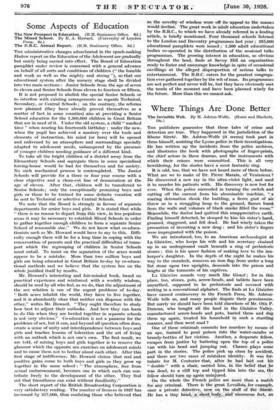Some Aspects of Education
THE administrative changes adumbrated in the epoch-making Hadow report on the Education of the Adolescent are gradually but surely being carried into effect. The Board of Education pamphlet under review is concerned with a general advance on behalf of all sorts and conditions of children (" the humble and weak as well as the Mighty and strong "), so that our educational system, after the nursery_ stage shall be divided into two main sections : Junior Schools froin the age of seven to eleven and Senior Schools froni eleven to fourteen or fifteen.
It is not proposed to abolish the special Senior Schools or to interfere with existing arrangements as regards Technical, Secondary, or Central Schools ; on the contrary, the reforms now planned (they have already proved themselves as a matter of fact in some counties) aim at providing a Senior School education for the 1,500,000 children in Great Britain that are in need of it. Under the old system, a child " marked time " when nearing his fourteenth birthday ; under the new, when the pupil has achieved a mastery over the tools and elements of instruction, his mind (or hers) will be opened and enlivened by an atmosphere and surroundings specially adapted to adolescent needs, unhampered by the presence of younger children needing guidance of a different kind.
To take all the bright children of a district away from the Elementary Schools and segregate them in some specialized forcing-house would be bad for themselves and for society. No such mechanical process is contemplated. The Junior Schools will provide for a three or four year course with a clear objective and a clean-cut line of demarcation at the age of eleven. After that, children will be transferred to Senior Schools ; only the exceptionally promising boys and girls or those to be trained for some definite vocation will be sent to Technical or selective Central Schools.
We note that the Board is strongly in favour of separate departments for senior boys and girls. -It is stated that while " there is no reason to depart _frog -this view, in less populous areas it may be necessary to establish Mixed Schools in order
to gather together enough children to form a separate Senior School of reasonable size." We- do not know what co-educa- tionists such as Mr. Howard would have to say to this. Diffi- culty enough there will be for a long time in coping with the conservatism of parents and the practical" difficulties of trans- port which the regrouping of children in Senior Schools must entail. To insist on the separation of the sexes would
appear to be a mistake. More than two million -boys and girls are being educated in Great Britain to-day by co-educa-
tional methods and we believe that the system has on the whole justified itself by results.
Mr. Howard's interesting and fair-minded book, based on practical experience and reinforced with a worldly wisdom, should be read by all who feel, as we do, that the adjustment of the sex relation is one of the urgent problems of to-day.
" Both sexes inhabit the world, they have to live together, and it is abundantly clear that neither can dispense with the other," writes Mr. Howard. " They ought therefore to study how best to adjust their outlooks. And how they can learn to do this when they are herded together in separate schools is not very obvious." Co-education is not a panacea for the problems of sex, but it can, and beyond all question often does,
create a sense of unity and interdependence between boys and girls and teaches lessons of toleration and the art of living with an outlook which is not one's own. The first result, we are told, of mixing boys and girls together is to remove the glamour which the opposite sex exercises on' adolescent minds and to cause them not to bother about each other. After this first stage of indifference; Mr. Howard claims that real and positive gains come to both boys and girls as they grow up
together in the same school " The atmosphere, free from sexual embarrassment, becomes one in which each can con- tribute freely to the development of the other. They find • out that friendliness can exist without familiarity."
The short report of the British Broadcasting Corporation is very satisfactory reading. The number of licences in 1927 has increased by 217,000, thus confuting those who believed that
as the novelty of wireless wore off- its appeal -to the masses would decline. The great work in adult education undertaken by the B.B.C., to which we have already referred in a leading article, is briefly Mentioned. Four thousand schools listened to the London and Daventry programmes last year ; 235,000 educational pamphlets were issued ; 1,500 adult educational bodies co-operated in the distribution of the sessional talks programmes. The growing interest in education, so obvious throughout the land, finds at Savoy Hill an organization ready to foster and encourage knowledge in spite of occasional cavillings at the alleged disproportion of serious talks to entertainment. The B.B.C. caters for the greatest congrega- lion ever gathered together by the wit of man. Its programmes are not perfect and never will be, but they have obviously met the needs of the moment and have been 'planned wisely for the future. More than this we cannot ask.








































 Previous page
Previous page